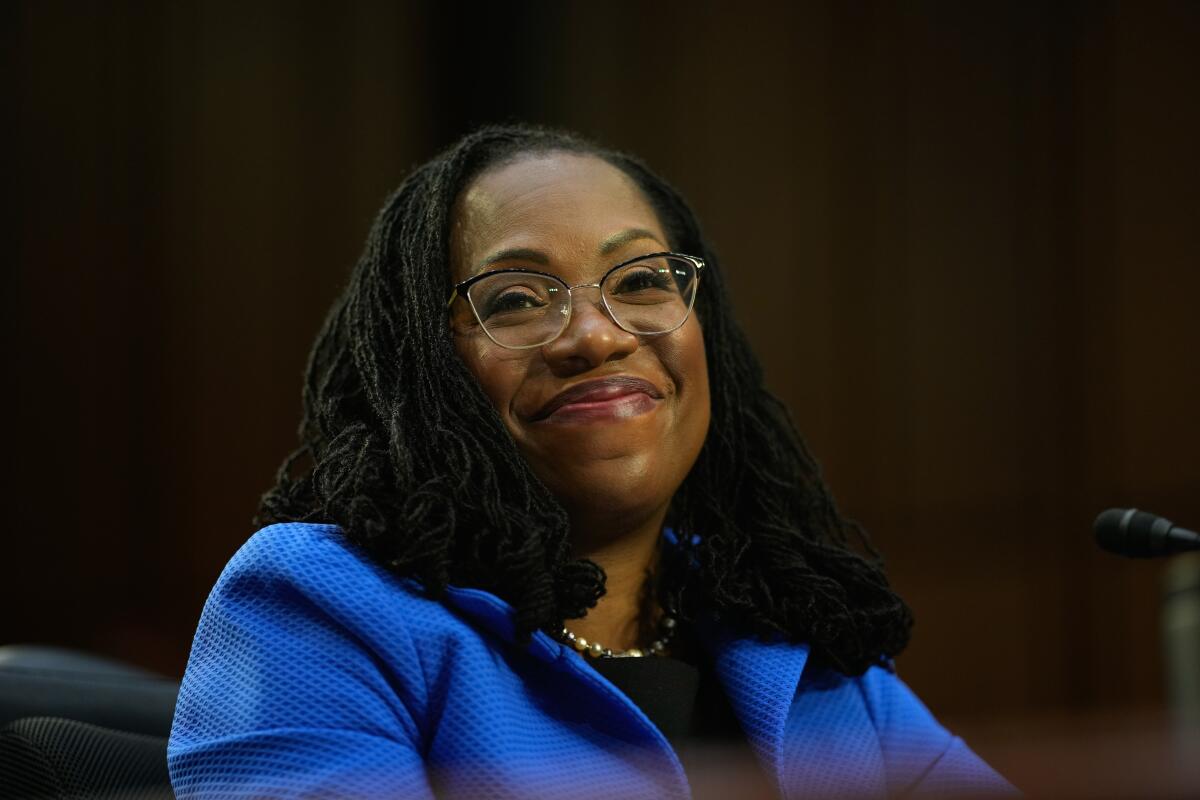Senate advances Jackson’s Supreme Court nomination after committee deadlocks

- Share via
WASHINGTON — The Senate on Monday advanced the nomination of Judge Ketanji Brown Jackson, President Biden’s Supreme Court nominee.
The chamber voted 53 to 47 to move the nomination to the floor after the Senate Judiciary Committee deadlocked 11 to 11 on recommending her confirmation earlier in the day.
Also Monday, two more Republicans — Sens. Lisa Murkowski (R-Alaska) and Mitt Romney (R-Utah) — announced their support for Jackson’s confirmation, joining Sen. Susan Collins of Maine in assuring Jackson’s final vote will be bipartisan.
Murkowski, who is up for reelection this year and faces a primary challenger backed by former President Trump, said her support rested on Jackson’s unquestionable qualifications and “my rejection of the corrosive politicization of the review process for Supreme Court nominees, which, on both sides of the aisle, is growing worse and more detached from reality by the year.”
Romney said he had concluded that Jackson “is a well-qualified jurist and a person of honor” who “more than meets the standard of excellence and integrity.”
Earlier in the day, however, partisan politics briefly delayed the confirmation process. The Senate Judiciary Committee’s 11-11 deadlock added another step for Senate Majority Leader Charles E. Schumer (D-N.Y.), who immediately filed a so-called discharge motion.
In floor remarks Monday afternoon, Schumer said he would move “as quickly as possible” to “set up a final confirmation vote by the end of this week.”
Although the split in committee was anticipated, the vote was delayed by a few hours when Sen. Alex Padilla (D-Calif.) had difficulties returning to Washington on Sunday.
Citing another passenger’s medical emergency that required his original flight to return to Los Angeles International Airport, a Padilla spokesperson said Monday the senator “boarded the first available flight this morning.” After Padilla arrived in the afternoon, the committee was able to vote.
In speeches before the committee vote, Democrats on the panel praised Jackson’s qualifications and experience, while Republicans explained their opposition.
Sen. Richard J. Durbin (D-Ill.), the committee chairman, called the vote a “historic moment for this committee and for America.”
It was the first time the committee had considered a Black woman for a seat on the Supreme Court.
Sen. Lindsey Graham (R-S.C.), who voted to elevate Jackson to the U.S. Court of Appeals for the District of Columbia Circuit less than a year ago but opposes her nomination to the Supreme Court, said “she would not have been before this committee” if Republicans were in charge of the Senate.
The deadlock is the first time the Judiciary Committee has split on a Supreme Court nominee in more than three decades.
In September 1991, when Biden chaired the committee, it voted 7 to 7 to send Clarence Thomas’ nomination to the floor with a favorable recommendation. That motion failed, but the committee voted 13 to 1 to send the nomination to the floor without recommendation, and Thomas was confirmed the following month, 52 to 48.
Why Ketanji Brown Jackson and Kamala Harris idolize civil rights lawyers like Constance Baker Motley
Kamala Harris and Ketanji Brown Jackson’s ascension to their historic posts reflects the enduring influence of a handful of civil rights lawyers.
Schumer’s move toward a discharge motion is rare but not unprecedented. An identical process played out during the nominations of Justice Department officials Vanita Gupta and Kristen Clarke, as well as other judicial nominees who deadlocked in committee and are still awaiting confirmation.
The discharge process requires up to four hours of debate, equally divided between parties, and a simple-majority roll call vote.
According to the Congressional Research Service, William C. Micou in 1853 was the last Supreme Court nominee to be discharged. However, the full Senate never considered his nomination.
As soon as Tuesday, Schumer is expected to file cloture on Jackson’s nomination, kick-starting up to 30 hours of debate before two additional simple-majority votes: one to end debate and the other to confirm Jackson as retiring Justice Stephen G. Breyer’s successor, likely before the end of the week.
More to Read
Get the L.A. Times Politics newsletter
Deeply reported insights into legislation, politics and policy from Sacramento, Washington and beyond. In your inbox three times per week.
You may occasionally receive promotional content from the Los Angeles Times.












